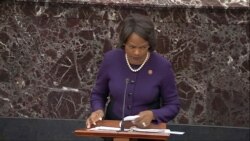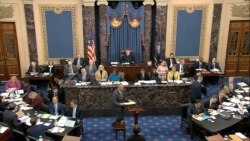U.S. House Democrats prosecuting the impeachment case against President Donald Trump and his defense team offered their closing arguments Monday at his Senate trial even as his acquittal remains all but certain.
Congresswoman Val Demings, one of the House lawmakers calling for Trump's conviction on two articles of impeachment, told the 100 members of the Senate acting as jurors in the case that Trump engaged in "a grave abuse of power unparalleled in American history."
She said that when Trump last July asked Ukrainian President Volodymyr Zelenskiy to investigate one of Trump's chief 2020 Democratic rivals, former VIce President Joe Biden, and his son Hunter Biden's work for a Ukrainian natural gas company, "the president was not focused on corruption," but rather looking to help himself politically on the assumption that Biden would be his opponent in next November's national election.
Demings said that Trump then blocked key aides from cooperating with House impeachment investigators and refused to turn over White House documents about his Ukraine-related actions
"That's what guilty people do," Demings contended during arguments against the president.
But Trump defense attorney Kenneth Starr argued that the House impeachment investigation of Trump was "a rush to judgment," unfairly conducted, and that the Senate "shouldn't reward the prosecutors." He said that to convict Trump would be to tell Trump's 2016 voters, "Your vote in the last election is hereby null and void."
White House counsel Pat Cipollone told senators that rather removing Trump from office, the only solution was "to leave it to the voters" to decide his fate in the election nine months from now.
Trump lawyer Jay Sekulow said, "This entire campaign of impeachment...was a partisan effort" targeting Trump. He said House Democrats "have cheapened the power of impeachment and unfortunately the country is not better for that."
But another House impeachment manager, Congressman Hakeem Jeffries, said that if Trump is not removed from office for his conduct, it would deal "a death blow" to the possibility of impeachment of U.S. presidents in the future as laid out in the U.S. Constitution. Jeffries said behavior such as Trump's "would become the new normal."
The vote on the two articles of impeachment against Trump — that he abused the power of the presidency with the Ukraine request and obstructed congressional review of his actions — is set for late Wednesday afternoon. A two-thirds vote in the Senate would be required for his conviction.
But Trump is all but assured of being exonerated, with Republicans holding a 53-47 majority in the Senate and none of them calling for his conviction and removal from office. The only question on the outcome appears to be whether any Democrats will vote to clear the Republican Trump or possibly a Republican vote to convict him.
Trump's lawyers, and the president himself, argue he did nothing wrong and that his actions did not rise to the level of an impeachable offense. Trump has long described his call to Zelenskiy as "perfect."
As the Democrats' arguments played out in the Senate, Trump resumed his broadsides on Twitter against his impeachment.
"I hope Republicans & the American people realize that the totally partisan Impeachment Hoax is exactly that, a Hoax," he tweeted. "Read the Transcripts, listen to what the President & Foreign Minister of Ukraine said (“No Pressure”). Nothing will ever satisfy the Do Nothing, Radical Left Dems!"
But in recent days a handful of Republicans have said they believe that Trump was wrong to ask Ukraine for the politically tinged investigations of the Bidens, although they said that the offense did not rise to impeachable misconduct severe enough to require his removal from office.
Both Sen. Lamar Alexander of Tennessee and Sen. Joni Ernst of Iowa said in interviews broadcast Sunday that Trump erred in asking Zelenskiy to "do us a favor" to launch the Biden investigations at the same time he was withholding $391 million in military aid Kyiv wanted to help fight pro-Russian separatists in eastern Ukraine.
Alexander, who provided a key vote late last week against the Democrats' effort to call Trump aides as witnesses in the impeachment trial, told NBC News's "Meet the Press" show that it was "crossing the line" for Trump to ask for the Biden investigations.“
I think he shouldn't have done it. I think it was wrong,” Alexander said.
"If the president was upset with what the Bidens were doing in Ukraine, he should've called the (U.S.) attorney general," William Barr, Alexander said. Asked why Trump didn't then, Alexander said, "Maybe he didn't know to do it."
But Alexander added, “I think what he did is a long way from treason, bribery, high crimes, and misdemeanors,” the U.S. Constitution threshold for an impeachable offense requiring removal from office. "I don't think it's the kind of inappropriate action that the framers would expect the Senate to substitute its judgment for the people in picking a president.”
He said voters in next November's national election, when Trump is running for a second term in the White House, should decide his fate.
"You know, it struck me, really for the first time, early last week, that we're not just being asked to remove the president from office," Alexander said, "We're saying, ‘Tell him he can't run in the 2020 election ..."
As the heart of the case against Trump ended Friday, another Republican, Sen. Ben Sasse of Nebraska said, "Let me be clear, Lamar speaks for lots and lots of us."
Ernst told CNN that Trump's request to Ukraine for the politically tinged investigations was "not what I would have done. He maybe did it in the wrong manner."
"He knows now he needs to go through the proper channels," such as the U.S. Justice Department, if he sees the need for an overseas investigation.
Nonetheless, she concluded, "Does it come to the point of removing a president? I don't think it does."
The key 51-49 vote against calling witnesses in the trial came Friday over Democratic objections. Democrats wanted to hear testimony from Trump's former national security adviser John Bolton, whom Trump ousted from his White House position last September. Bolton reportedly says in a forthcoming book that Trump told him directly last August that he wanted the Biden investigations before he would release the military aid, a direct contradiction of Trump's claim there was no reciprocal quid pro quo deal with Ukraine, the defense assistance in exchange for the Biden investigations. Trump denied the claim in the Bolton book, "The Room Where It Happened."
Trump released the aid in September after a 55-day delay without Zelenskiy opening the Biden investigations, proof, Republicans say, he had no quid pro quo deal with Ukraine.







